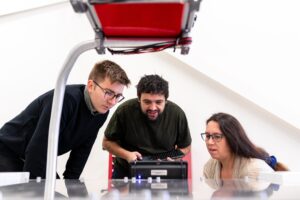
Scientific research needs time: the long time required to develop it and the time for public validation. A very long process from the conception of research to its publication in recognised scientific magazines implies a great range of possible missteps and setbacks, some related to the advancement of the research itself—others caused by forces that often have little to do with actual science.
Not much can be done against the first of these 2 limits besides the preparation and study that are the obvious prerequisites. In contrast, the second one can be tackled from different angles and the beginning since it implies human-made practices. It is good news today for researchers and their research that the rough route toward approval has never been questioned as much and as fast as it is in these Covid times. One recent and, as of now, successful attempt in this sense is the startup Qeios. This online journal has been developing for the last three years – i.e. before the pandemic boosted the case for scientific research – by an Italian then medicine student, Gabriele Marinello.
Conceived in the UK with a world-reach in mind, the journal aims to disrupt the current process for approval by reducing (basically eliminating) the timespan that separates the research’s submission to its publication in scientific magazines. But also to eradicate the biases mining the whole route. To be published and then acknowledge internationally, research must be accepted by the editors of one of the recognised scientific journals. If approved, the magazine’s editors choose 2 or 3 (peer)reviewers to validate the study. The procedure can last months; it does not seem to have undergone substantial transformations for decades and still relies on human-based decisions and approval.
More open access to research
 The pandemic has shown how open access to research developed worldwide is beneficial. Sharing information and results in real-time allowed scientists and industries to identify the virus and develop multiple vaccines in months, making more accessible data and knowledge a key driver for other research(ers). Launched in 2019, Qeios, in a sense, anticipated the trend boosted by the emergency response to the spread of Covid. And it has since then experienced some positive consequences, as Gabriele Marinello explained in our recent interview. “We now have more than 15.000 registered scientists and over a million readers. And we definitely saw a spike in use and growth after Covid.” Qeios speeds up the process for scientific research validation bringing the approval time down from many months to a matter of days without lowering the quality of the research.
The pandemic has shown how open access to research developed worldwide is beneficial. Sharing information and results in real-time allowed scientists and industries to identify the virus and develop multiple vaccines in months, making more accessible data and knowledge a key driver for other research(ers). Launched in 2019, Qeios, in a sense, anticipated the trend boosted by the emergency response to the spread of Covid. And it has since then experienced some positive consequences, as Gabriele Marinello explained in our recent interview. “We now have more than 15.000 registered scientists and over a million readers. And we definitely saw a spike in use and growth after Covid.” Qeios speeds up the process for scientific research validation bringing the approval time down from many months to a matter of days without lowering the quality of the research.
Quite the opposite, according to its ceo, who clarifies: “we receive a median of 10 peer reviews per article. The median time to get 3 peer reviews (the traditional publication market) is 7 days. In contrast, the median timespan from submission to publication for biomedical journals varies from 70 to 558 days. Also, peer reviews on Qeios are generally more constructive“. Because as he explained further, one of the startup’s main traits is its transparency; from its submission of the research to the comments posted and the observations by the peer reviewers, the interaction is open and accessible online. In this way, it goes hand-in-hand with the writers’ reputation in writing a review or commenting on the entries.
A crowd-sourced future for research?
 In brief, the journal claims they “are building the future of research. We provide researchers and research organisations with a new Open Science platform to publish top-notch, bias-free, faster and at a fraction of the current costs“. And it is doing this by incorporating modern technology* to standard, agreed upon and old methods to shorten the process and reduce biases that prevent a quicker yet accurate development of science.
In brief, the journal claims they “are building the future of research. We provide researchers and research organisations with a new Open Science platform to publish top-notch, bias-free, faster and at a fraction of the current costs“. And it is doing this by incorporating modern technology* to standard, agreed upon and old methods to shorten the process and reduce biases that prevent a quicker yet accurate development of science.
Even if we are not part of the scientific community and may have just recently become aware of how it works, most of us today better understand its potential. And grab the possible benefits of a more connected, shared, and faster (yet high-quality) research process. Especially in an era of quick and dramatic changes to the known way of living.
 It may be too early to state if crowd-sourced peer review can truly have in the long term the same striking impact it has had in recent times of crisis and the advantage in terms of eliminating or reducing constraining biases. But many signals point in that direction. More and more researchers now, for example, are shifting towards forms of public recognition alternative to traditional magazines. Which, on their side, have also started to change some of their more conventional mechanisms.
It may be too early to state if crowd-sourced peer review can truly have in the long term the same striking impact it has had in recent times of crisis and the advantage in terms of eliminating or reducing constraining biases. But many signals point in that direction. More and more researchers now, for example, are shifting towards forms of public recognition alternative to traditional magazines. Which, on their side, have also started to change some of their more conventional mechanisms.
When it comes to Qeios’ which is already indexed on Google Scholar, archived in Portico and the British Library, and currently applying to be indexed by PubMed and Web of Science, there is a further plus. Soon it may get recognition as a proper scientific journal, meaning that – as explained in a recent article on Columbia Mailman School of Public Health – “when academics publish there, it counts toward tenure and promotion, giving it another advantage over preprint servers.”
—
* Once published by the researcher, thanks to the use of a specific AI, the journal create a list of appropriate and qualified peer reviewers that best match the subject of the submitted study chosen by exploring an external scientific database.
***
Alley Oop’s newsletter
Every Friday morning Alley Oop arrives in your inbox with news and stories. To register click here.
If you like to write or contact the Alley Oop’s editorial team, the email address is alleyoop@ilsole24ore.com